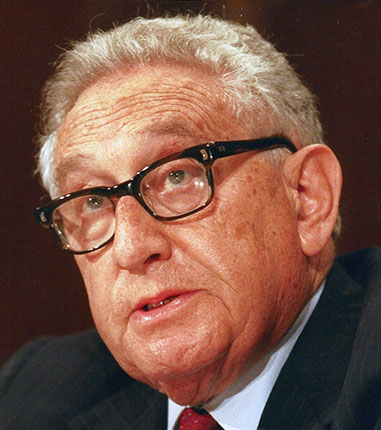
You are Cordially Invited to the 4th Annual Lecture of the Johnson Center for the Study of American Diplomacy
World Order 2025:
The Honorable Dr. Henry Kissinger: “Conflicting Visions of the International State System”
Friday, April 10, 2015
Dr. Henry Kissinger’s latest work, World Order, is an engrossing historical survey that traces the roots of international cooperation and conflict from the ancient world to the present day. The book situates the American experience and the international challenges of today amidst a global quest for order that spans humanity, from Cardinal Richelieu to Metternich and Bismarck, and from the Indian minister Kautilya of the 4th century B.C. to the Ottoman Sultan Suleiman. World order, Dr. Kissinger argues, is neither a monolithic entity nor an inevitable consequence of statecraft, but rather a cultural, historical artifact shaped by the character and experiences of specific people.
Today’s world order is a descendant of the Westphalian system that developed in 17th century Europe in response to the brutal religious violence of the Thirty Years War (1618- 48). Yet this system seems increasingly under attack. Conflict rages in the Middle East, with the rise of the Islamic State of Iraq and Syria plunging both nations into violent chaos. Russia under Mr. Putin appears increasingly expansionist with respect to Ukraine and its so-called “near abroad,” posing a fundamental challenge for Europe and America.
Afghanistan and Pakistan remain volatile. The Iranian nuclear program looms large. And tensions continue to rise in the East and South China Seas.
The fourth annual Johnson Center lecture will examine how the historical and cultural traditions of different countries inform their approaches to statecraft. What is the vision for world order that critical countries desire for the next decade, and what are the implications of those often conflicting visions for the future of the international state system? How can the United States build a shared international order in a world of divergent historical perspectives, violent conflict, and ideological extremism? How can we learn from diplomatic history, such as the Peace of Westphalia that ended the Thirty Years War, and translate those lessons to our modern technological world?
Schedule
Friday, April 10
2:30-2:45pm Welcome by Yale President Peter Salovey and The Honorable Dr. Henry Kissinger (With Introduction from Jim Levinsohn and John Gaddis). Location: Yale Law School Levinson Auditorium, 127 Wall St.
2:45-4:15pm Conversation Featuring Dr. Kissinger. Yale Law School Levinson Auditorium, 127 Wall St.
Moderator: Professor Niall Ferguson, Laurence A. Tisch Professor of History, Harvard University